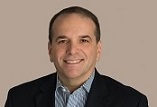 Name: Rick Werber
Name: Rick Werber
Title: Senior Vice President, Engineering and Sustainability | Development, Design and Construction
Company: Host Hotels & Resorts, Inc.
Years with Host Hotels & Resorts, Inc.: Seven
Primary responsibilities: Werber is responsible for global strategic capital infrastructure planning and execution, enterprise-wide supply-and-demand-side energy and utility management, and the evaluation and implementation of energy and utility-related ROI initiatives, with a focus on improving sustainability and increasing efficiency of operations to create and drive value. Additionally, Werber co-chairs Host’s Corporate Responsibility (CR) team, a cross-functional team charged with developing the organization’s CR framework and integrating policies within its business practices at the corporate and portfolio levels.
Organization’s most significant sustainability-related accomplishment: “It goes back five to six years when Amy Hamstead and I created the sustainability platform for Host Hotels. We became much more strategic in our thinking. That sustainability platform consists of three themes: Responsible Investment, Environmental Stewardship, and Corporate Citizenship.”
Organization’s most significant sustainability-related challenge moving forward: “From a pure energy and water consumption standpoint, much of the low hanging fruit has been picked. The easy things have been done. Now we are looking at the second tier of steps that require further research and development.”
BETHESDA, MD.—For years now Host Hotels & Resorts has been one of the lodging industry’s leading REITs when it comes to energy management, carbon emissions reduction, water management and overall sustainability performance. In 2015 Host Hotels & Resorts was one of two NAREIT Leader in the Light winners in the Lodging/Resorts category. In 2014 Host was on the CDP A List—a list of companies around the world doing the most to combat climate change.
Being recognized as a leader not only among REITs but throughout the lodging industry is the result of the work of a team of talented industry veterans, one of whom is Rick Werber, Senior Vice President, Engineering and Sustainability | Development, Design and Construction for Host Hotels & Resorts. Werber has been instrumental in guiding investment in capital projects that have resulted in significant savings for the Bethesda, Md.-based REIT that currently has 115 hotels in its fold.
Adding value to the Host portfolio is the focus of Werber, who first worked in lodging as a chief engineer trainee at the Newton Marriott in Newton, Mass. “I grew up in the engineering ranks,” he says.
Shining Example of Renewable Energy Investment
Werber was recently part of the team that worked on the design, purchase and installation of a solar photovoltaic system at the Hyatt Regency Maui Resort and Spa in Lahaina, Hawaii. The system of solar panels produces more than 6 percent of the resort’s annual electricity needs, which is equal to supplying grid electricity to 158 homes. In 2014 the resort became Hawaii’s first LEED EBOM Silver resort. The solar project is just one example of a capital investment driven, in part, by Host. Projects at other hotels range from cogeneration plants to water harvesting systems to LED re-lamping.
With regard to renewable energy systems, Werber says Host looks to purchase instead of entering into power purchase agreements (PPAs) because 100 percent of the savings drops to the bottom line. “It is challenging to find a way to make renewable energy projects work for REITs,” he says. “It is still relatively expensive technology with paybacks in the eight to 10 year range. What makes them possible is local rebates and tax incentives which can be difficult for REITs to leverage.”
As the owner of hotels such as the New York Marriott Marquis and the Westin Seattle, Werber says Host prides itself on working with many of the top management companies. “The management companies have the right to review, approve or deny capital investments,” he says. “We work closely with brand engineers and energy managers. Open communications is critical. While many of the projects are conceived by Host, many also get percolated up from the brands. We do want to ensure that someone at the brand, in an energy capacity, has vetted a project thoroughly before the proposal comes to us.”
Host Reached Energy Reduction Goal Early
In 2014, Host exceeded its 2017 target to achieve a 12 percent reduction in greenhouse gas (GHG) emissions per square foot and available room—three years early (baseline 2008). The company is also making progress toward its 12 percent energy goal per square foot and available room and 15 percent reduction in water consumption per occupied room (2008 baseline). Host is establishing all new targets this year.
Host’s environmental stewardship strategy is to:
• Proactively monitor the energy, water and waste performance across its portfolio;
• Collaborate with hotel managers to implement approved investments and operational best practices to achieve mutual environmental goals;
• Establish long-term capital investment plans for all assets which consider equipment and system upgrades that improve efficiency and conserve natural resources;
• Evaluate sustainable solutions, building technologies, designs, materials and construction practices and validate their effectiveness in reducing energy, water and waste; and
• Disclose select environmental performance data against its environmental stewardship targets.
Host is committed to being a responsible corporate citizen and to strengthening its local communities. It does this through financial support, community engagement and volunteer service. Last year, Host was awarded the Corporate “Biggest Bucket” Award by the ALS Assn. for making one of the largest contributions in the region in support of the Ice Bucket Challenge fundraising efforts.
In Search of Products ‘That Perform as Promised’
When asked to describe one of the challenges of his work, Werber says it is having to sift through all of the new green products and technologies available in the marketplace. “What has complicated our jobs is the popularity and marketability of sustainability,” he says. “It seems like everyone is interested in peddling their greenware. Sometimes the products do not deliver as promised or are not the right application for our industry. Thoroughly evaluating new technologies can take a lot of time. Some suppliers tend to underestimate the investment and/or overstate the savings. We are looking for products that perform consistently and can be replicated from one property to another.”
Werber says Host does its best to impact the supply chain through its capital renovations. “Where we influence it is in FF&E, architectural supplies, typical construction materials and waste stream management,” he says. “We recycle mattresses, padding and carpeting where economically feasible, source locally whenever we can, and use SmartWay transportation partners.”
Prior to joining Host in 2009, Werber held a variety of senior corporate and operations leadership positions with Marriott International, Sodexo, and Sunrise Senior Living. He graduated from the Cornell University School of Hotel Administration where he is on the Advisory Board for the Center for Hospitality Research. Additionally, he holds Real Property Administrator (RPA) and Facilities Management Administrator (FMA) designations from BOMI International, where he previously served on the board of trustees.
Go to Host Hotels & Resorts.
Glenn Hasek can be reached at editor@greenlodgingnews.com.







